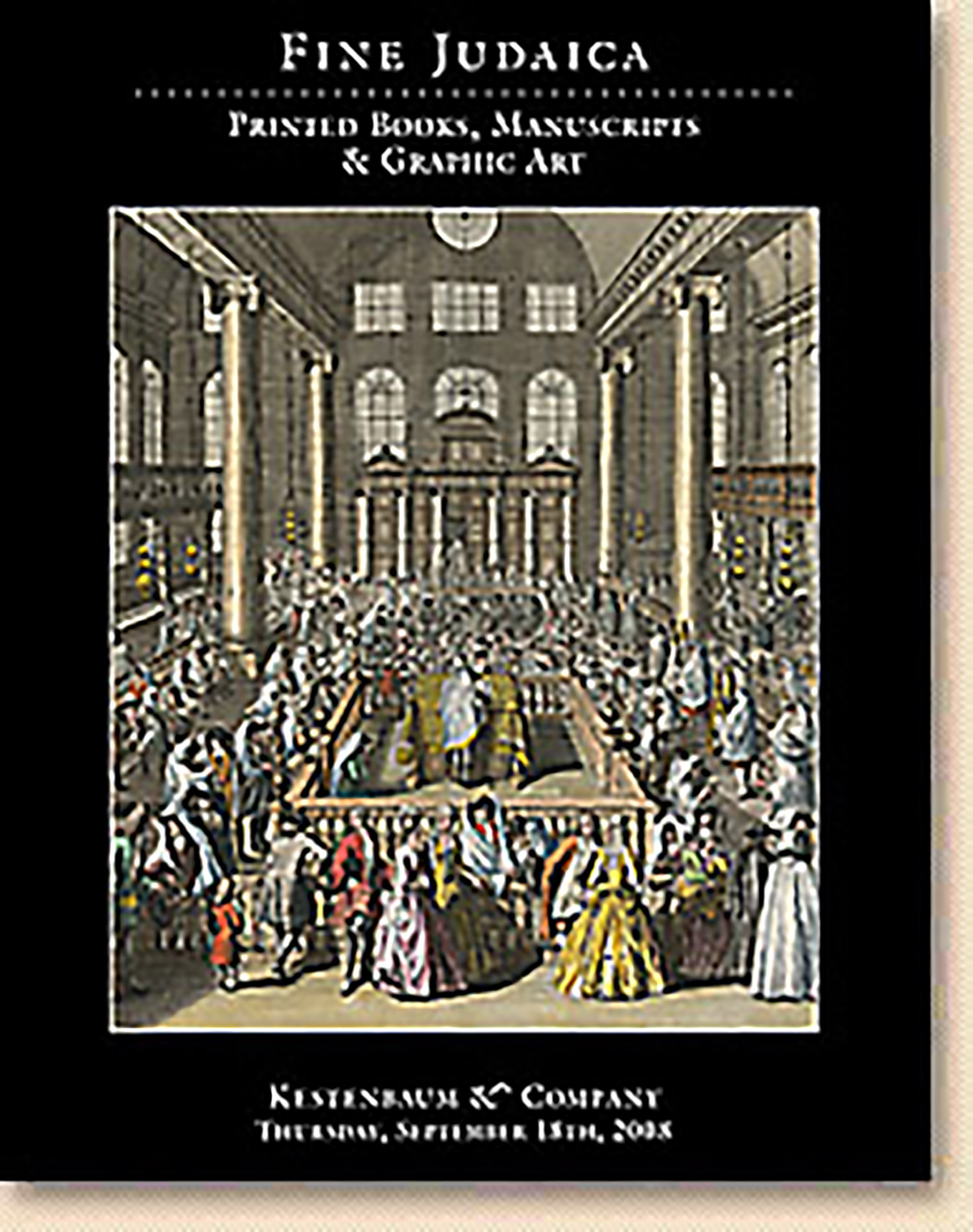POPPERS, MEIR HAKOHEN. Ohr Zaru'a [glosses to R. Chaim Vital, Eitz Chaim, from beginning, i.e. Sha'ar ha-Kelalim, through Sha'ar Rachel ve-Leah]

AUCTION 41 |
Thursday, September 18th,
2008 at 1:00
Fine Judaica: Printed Books, Manuscripts, & Graphic Art
Lot 334
(KABBALAH).
POPPERS, MEIR HAKOHEN. Ohr Zaru'a [glosses to R. Chaim Vital, Eitz Chaim, from beginning, i.e. Sha'ar ha-Kelalim, through Sha'ar Rachel ve-Leah]
Jerusalem: 19th-Century
Est: $2,000 - $3,000
PRICE REALIZED $2,000
Unpublished Manuscript of Work by R. Meir Hakohen Poppers from the Beth-Medrash of Beth El, Jerusalem.
R. Meir Hakohen Poppers (d. 1662), the last editor of the Lurianic writings, is considered one of the most authoritative interpreters of that system of Kabbalah. Of Aschkenazic descent, Poppers studied under R. Jacob Tzemach in Jerusalem. Popper's tripartite division of the Lurianic corpus into Derech Eitz Chaim, Peri Eitz Chaim and Noph Eitz Chaim, became the accepted arrangement in Germany and Poland.
Although it appears this manuscript might be lacking the Author's introduction, the body of the work is complete. All the copies known to Scholem also terminated with Sha'ar Rachel ve-Leah; Scholem wondered whether Poppers had ever penned any more than that. By the same token, though the introduction boasts glosses to "Derech Eitz Chaim, Peri Eitz Chaim and Noph Eitz Chaim," the copies consulted by Scholem were restricted to Derech Eitz Chaim, as is ours. Of interest is that Scholem records that the manuscript of Ohr Zaru'a (no. 102) "was purchased in Hebron in 1927." The present manuscript also originated in Hebron as attested to on p.1. (See EJ, Vol. XIII, cols. 865-66).
Poppers (f.7r.) alludes to a work of his in manuscript entitled "Ohr ha-Avukah." (See also Scholem, Kitvei-Yad be-Kabbalah, p. 148.)
Aaron Raphael Chaim Moses ben Isaac Pereira (known by the acrostic "Ephe"r Yitzchak"), a native of Salonika, settled in Jerusalem in 1848, where he became a prominent member of the Kabbalistic fraternity "Beth El". His works include: Toldoth Aharon u-Moshe / Efer Yitzchak, a volume of Kabbalistic responsa (Jerusalem 1870); Devar Hashem mi-Yerushalayim, concerning the city of Jerusalem (ibid., 1873); and Ohev Shalom ve-Rodeph Shalom, an appeal to rebuild the Temple by promoting love of humanity (ibid., 1880). Scholem describes a copy of the Siddur Rasha"sh, the prayerbook with Kabbalistic meditations of R. Shalom Sharabi (18th-century spiritual leader of Beth El), in the hand of R. Aaron Pereira, replete with the latter's learned emendations. See A.L. Frumkin and E. Rivlin, Toldoth Chachmei Yerushalayim, Pt. III (1929), p. 306, no. 2; S. Halevy, Siphrei Yerushalayim ha-Rishonim (1975), nos. 163, 192, 336; Scholem, Kitvei-Yad be-Kabbalah (1930), 123-128.
On ff. 6v.-8r. there are marginalia in a large hand signed "Ephe"r Yitzchak." These are R. Aaron Pereira's criticism to R. Meir Poppers. In his marginalia Pereira mentions Sheme"sh [=Shalom Mizrachi Sharabi] and To[rath] Ch[acham], a commentary to Vital's Eitz Chaim by R. Chaim de la Rosa (Salonika 1848). The extreme piety of the glossator is reflected in the fact that each comment begins with the formula "Li-chevod Kudsha Berich Hu u-Shechinteh" [In honor of the Holy One, blessed be He, and His Indwelling]
